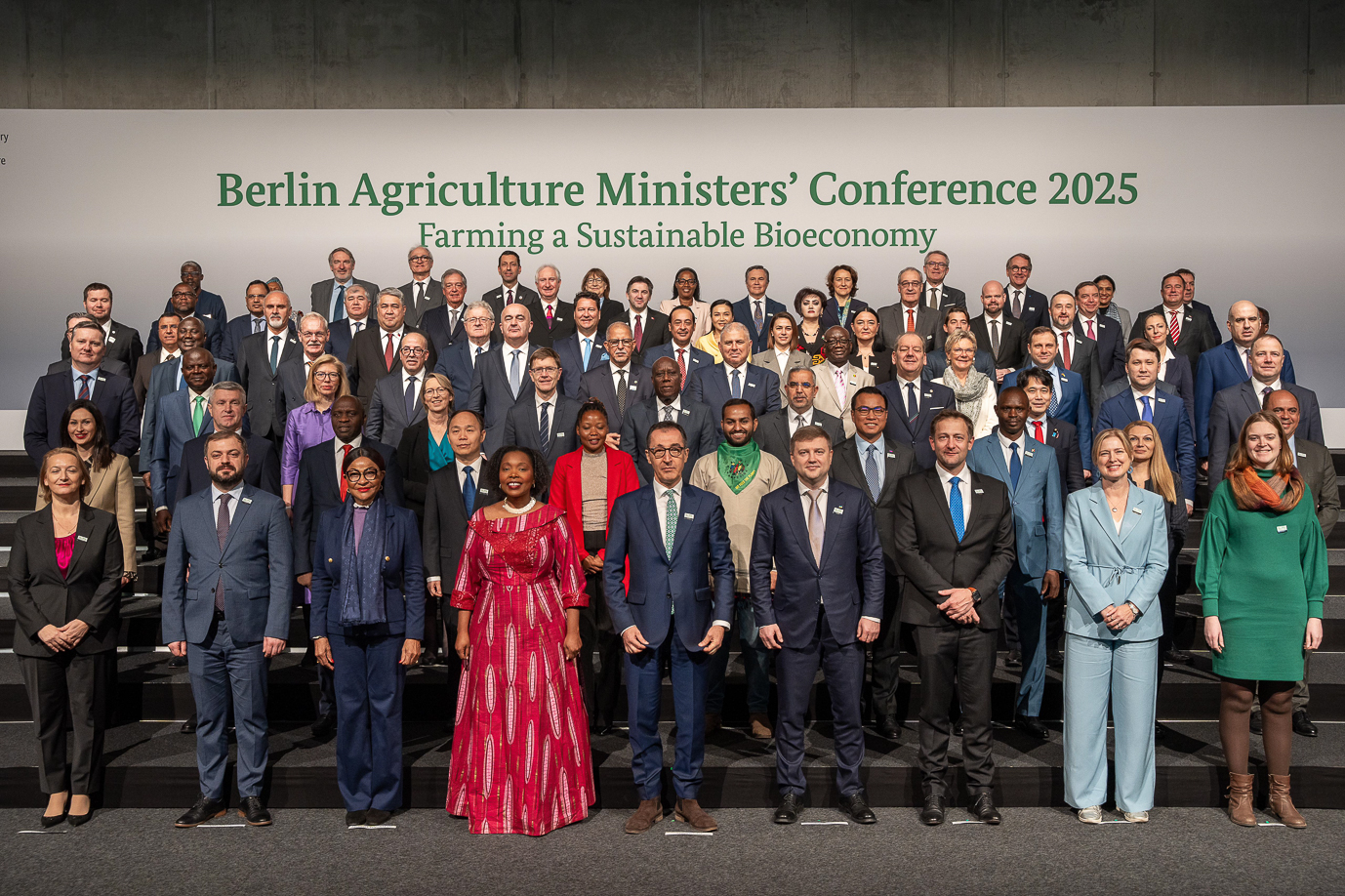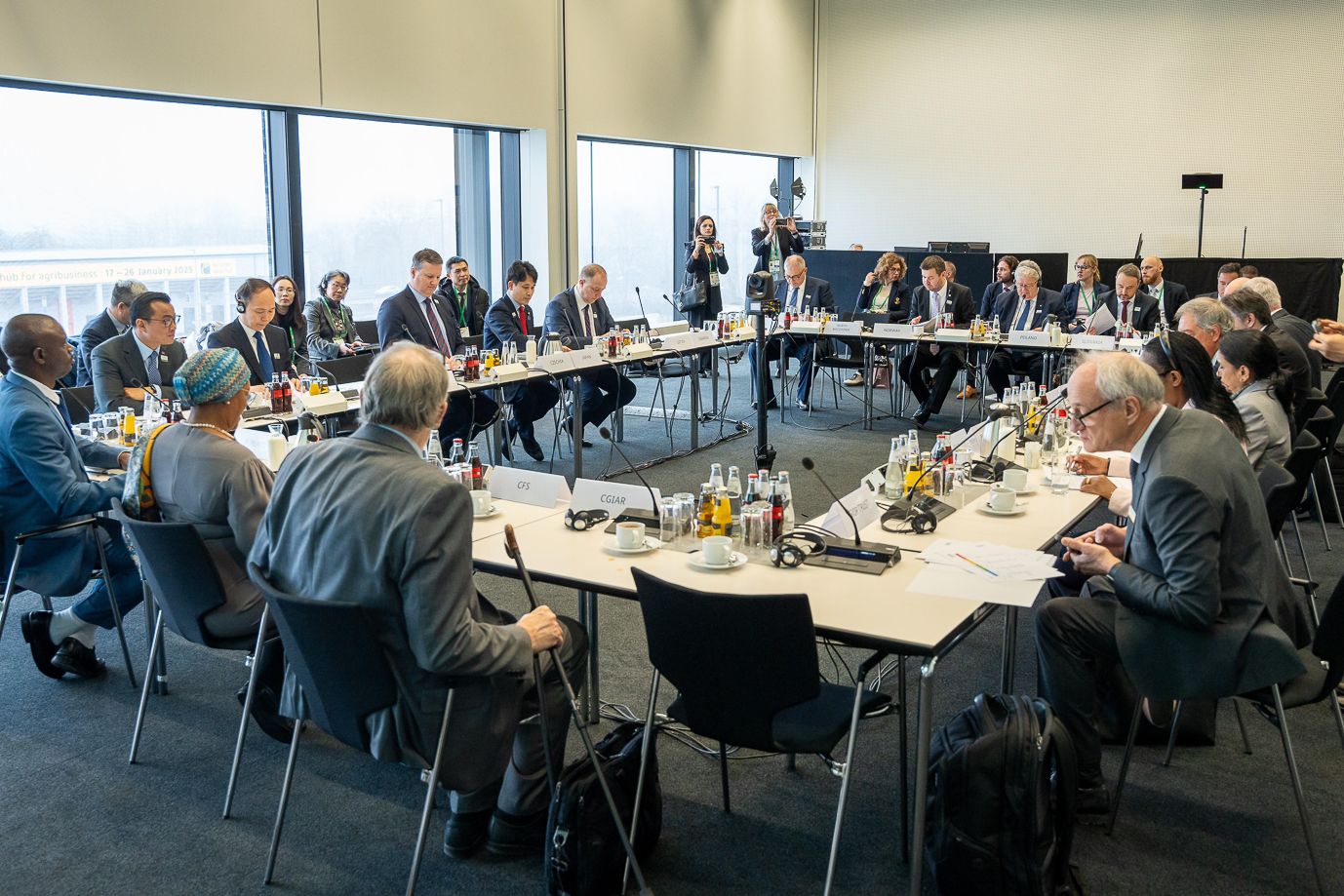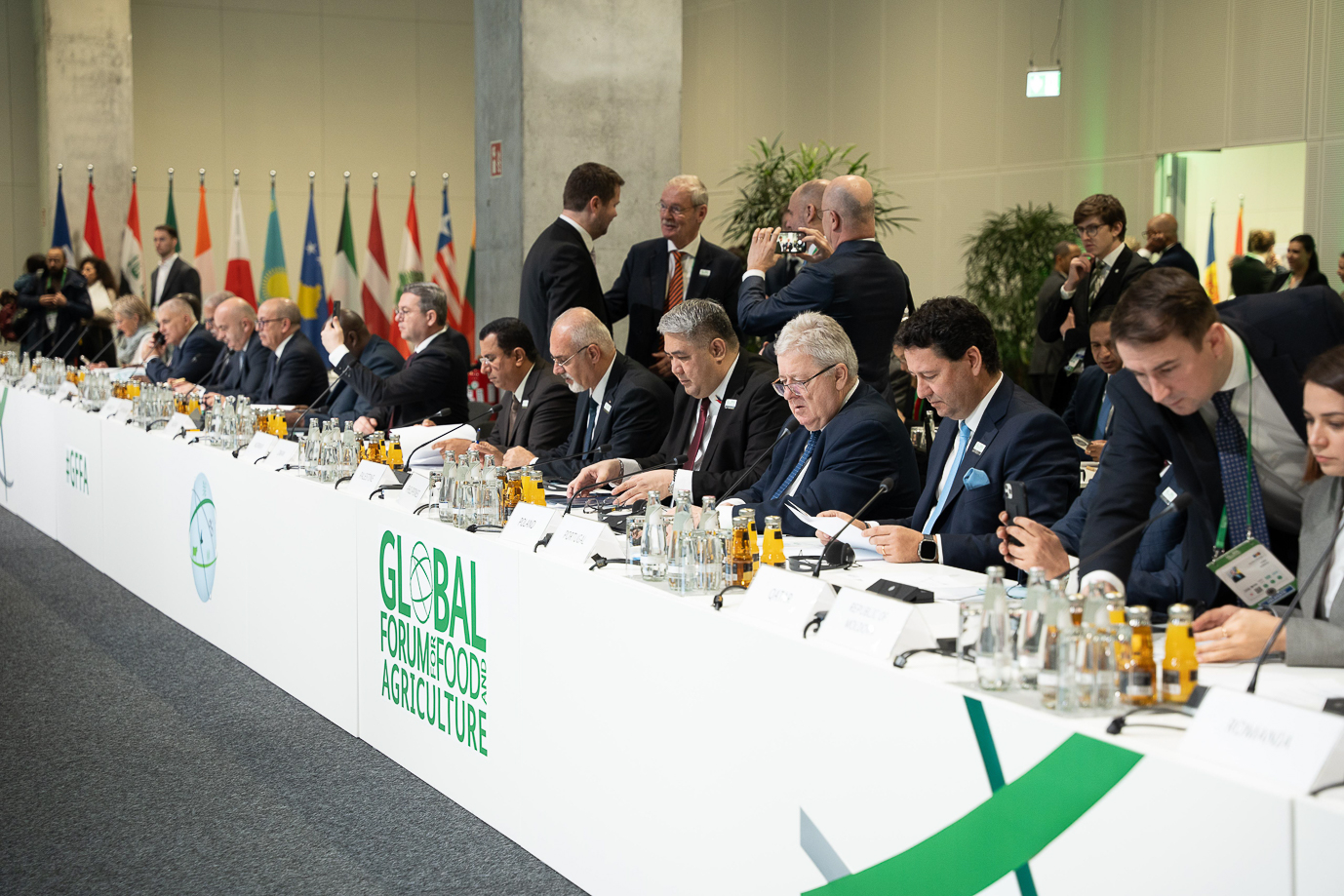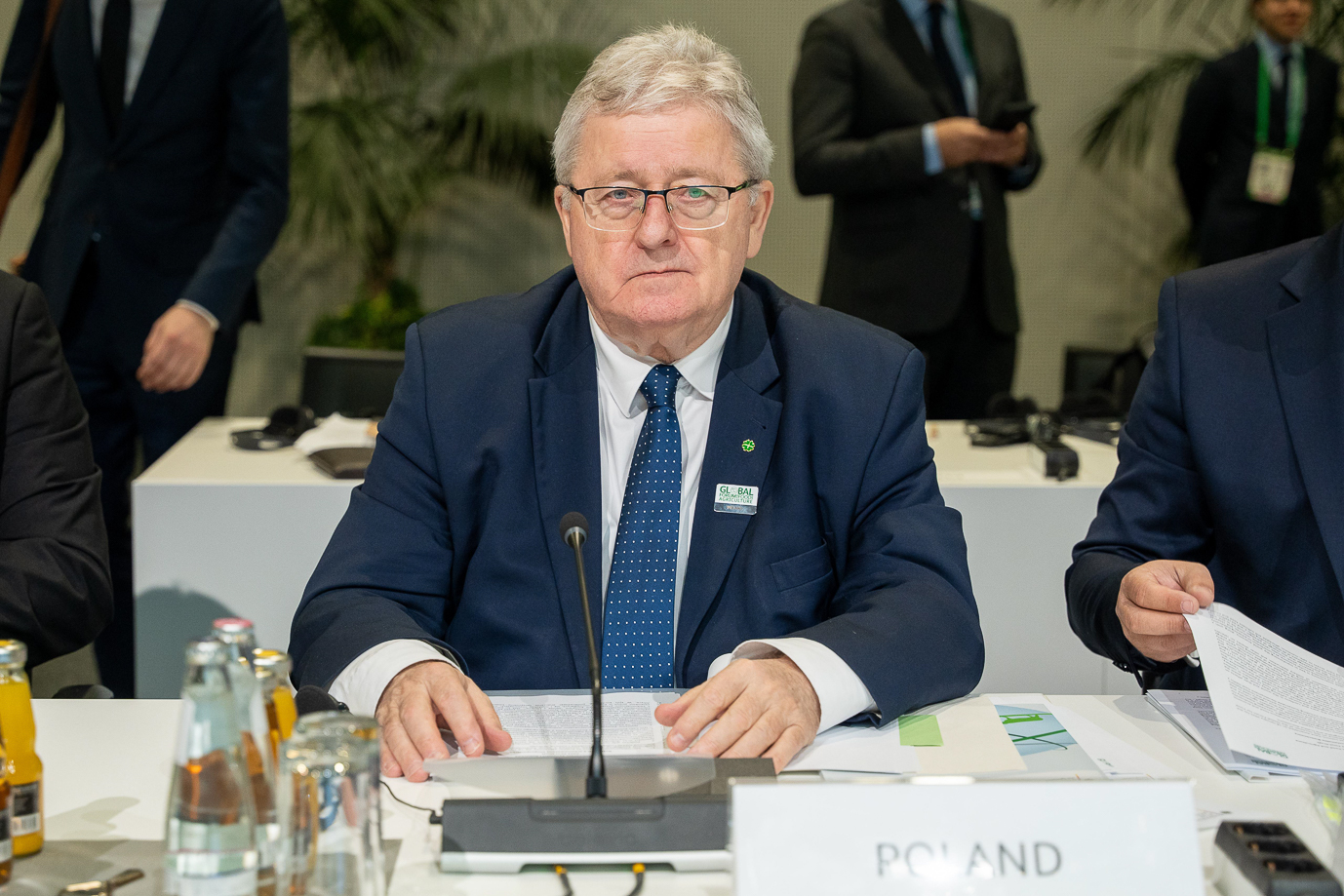The Global Forum for Food and Agriculture: together for a sustainable economy and a world free from hunger
18.01.2025
The Global Forum for Food and Agriculture (GFFA) is held during the International Green Week fair in Berlin, this year under the theme “Farming a Sustainable Bioeconomy”. The conference was attended by about 70 Ministers of Agriculture from all over the world, as well as representatives of many international organisations. Minister of Agriculture and Rural Development Czesław Siekierski participated in the thematic session “Sustainably using biomass – Ensuring global food security”.

Foundations of the Polish Presidency of the Council of the EU
In his speech, Minister Czesław Siekierski pointed out that the issue of global food security was closely related to the priorities of the Polish Presidency of the Council of the EU, which we were holding that half-year, for the second time in the 20-year period of our membership.
– The foundation of our Presidency is security, and food security is one of its elements. We are all aware that the overarching goal of agriculture is to ensure food security – said the head of the Polish Ministry of Agriculture.
Sustainable bioeconomy
Minister Siekierski stated that we needed sustainable and, at the same time, highly efficient agriculture, which on the one hand protected natural resources, and on the other – made use of the opportunities offered by bioenergy and the bioeconomy.
– An important element of the bioeconomy are innovative solutions in agriculture, also at the farm level. Therefore, precision farming, agroecology and other advanced agricultural practices that contribute to sustainable and efficient production should be supported – stressed the head of the Polish Ministry of Agriculture.
Problem of food waste
– When it comes to preventing food waste, in Poland we perceive it as a global problem in economic and ethical aspects. Firstly, this is a missed opportunity to reduce the number of malnourished people. Secondly, this is a huge loss of resources such as: soil, water and energy required to produce food. Finally – this is a loss of financial resources, both on a macro scale and on the scale of each household – stated Minister Siekierski.
Joint communique of the Ministers of Agriculture
The meeting ended with issuing a joint communique. The Ministers of Agriculture specified therein their attitude toward the sustainable bioeconomy and sustainable agriculture being its important part.
In the joint communique, the Ministers stated, among others, that:
- While the global growing population requires healthy and nutritious food and economic prosperity, decreasing natural resources, soil degradation and drought, growing biodiversity loss, and the effects of climate change and pollution are serious challenges, particularly for developing countries. Therefore, sustainable and resilient agriculture and food systems are key to global food and nutrition security. Thus, it is necessary to urgently intensify efforts and call upon the global community to join forces.
- Wars and conflicts all over the world as well as their impact on food security are of serious concern.
- The sustainable bioeconomy is essential to the transformation of the global economy. Agriculture plays a key role in this change since sustainable primary production of biological resources and resulting products and services form the basis of the sustainable bioeconomy.
- Sustainable biomass production and the use and valorisation of agricultural, forestry and water biomass, as well as by-products will be promoted. The use of biomass is important so as to maximise resource efficiency, minimise waste and reduce outlays for new materials, which consequently increases the overall availability of biomass in a given system. Climate benefits of using biomass are high.
- The bioeconomy may contribute to the social, economic and environmental development and to achieving the Sustainable Development Goals. The sustainable bioeconomy may support the preservation, restoration and resilience of ecosystems and strengthen ecosystem services as well as nature-based solutions.
- • An increased demand for biomass for food and non-food purposes may lead to conflicts of interest, creating competition between various end-users with regard to the use of natural resources such as land and water. However, reconciling these interests is possible. In solving these problems, the priority is the gradual implementation of the right to adequate food in the context of national food security and sustainable development.
- The sustainable bioeconomy provides solutions with respect to climate change mitigation, by providing a climate-neutral resource base and carbon sequestration options.
- Efforts to stop and reverse land degradation will be reinforced.
- Measures will be carried out to restore, protect and sustainably manage natural resources while ensuring the protection and sustainable use of biodiversity.
- Sustainable practices such as drought management and strengthening drought resilience, as well as the use of unconventional water resources to protect water resources in agriculture will be promoted.
- Sustainable agriculture and food systems will be promoted through approaches such as agroecology, agroforestry, integrated, regenerative and organic farming, conservation farming, climate smart farming, precision farming, sustainable intensification, urban farming systems and other innovative approaches.
- The sustainable blue bioeconomy is essential for all industries and sectors related to oceans, seas, coasts and lakes. Sustainable fisheries and aquaculture are of crucial importance to food security and nutrition and a healthy planet.
- Measures will be carried out to counteract food and feed contamination and the prudent and responsible use of antimicrobials will be promoted.
- The diversification of protein sources may contribute to increasing global food and nutrition security. It may also contribute to decreasing the resource demand, reducing greenhouse gas emissions and restoring ecosystems, while shifting to sustainable breeding of livestock and fisheries.
- The sustainable bioeconomy and the circular economy may reduce food losses and waste.
- A commitment has been made to halve global food waste per capita at retail and consumer levels by 2030 and to reduce food losses in production and supply chains.
- Science, technology and innovation, training, communication and cross-sectoral cooperation are key elements of a successful transition toward the global sustainable bioeconomy, while recognising traditional knowledge and cultural heritage. Raising consumer awareness as regards the benefits and value of bio-based products is essential to supporting sustainable consumption patterns.
- Trade is important for the functioning of the bioeconomy. The Ministers committed themselves to promoting a rules-based, open, predictable, transparent, non-discriminatory, sustainable, fair, honest and inclusive multilateral trading system based on the World Trade Organisation (WTO).
- The Ministers committed themselves to supporting the sustainable bioeconomy and seeking to achieve food security based on four pillars: availability, accessibility, use, and stability.
- When the world is struggling with an unprecedented number of crises, the Ministers committed themselves to acting together and cooperating closely in a spirit of peace and cooperation for a sustainable and resilient world free of hunger and malnutrition with a thriving bioeconomy.




